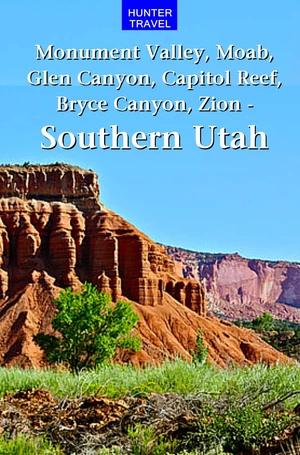Utah is home to canyons and mountains, desert and abundant waterways, thriving cities. The Beehive State (so called because of the industriousness of its residents) is the geological crossroads of the elevated tableland known as the Colorado Plateau, the western slope of the Rocky Mountains and the Great Basin, the huge expanse of land cradled between the Sierra Nevada and Wasatch mountain ranges. The state boasts six national monuments, five national parks, countless wilderness areas and thousands of additional acres of public lands accessible for hiking, biking, skiing, rafting, fishing, and much more - one of the greatest year-round concentrations of adventurous pastimes. The preponderance of rugged, virtually primeval terrain lends itself naturally to high adventure. Furthermore, the territory has long been one of the most spiritually important places to the native peoples who were first to settle here, and whose ancient mysteries and modern presence are keenly felt today. If you want to experience the special nature of this exceptional area, and to get out and do things, this book is for you. It provides all the nuts-and-bolts information you need to plan and accomplish an informed trip, as well as specific details on a variety of adventures. There may be more deer, antelope, bighorn sheep, lizards, and rattlesnakes than human residents in southern Utah, an epic sandstone wonderland that includes Arches, Canyonlands, Capitol Reef, Bryce Canyon and Zion National Parks, the Glen Canyon Recreation Area, Lake Powell, several national monuments, remote primitive areas and state parks. Beside sheer size, these lands include some of the most unusual and improbable landscapes in the world. Red sandstone buttes, blue mesas, purple rock pinnacles, narrow spires, and deep, plunging canyons line the muddy Colorado River and decorate the uplands of the Colorado Plateau as if it were a rock garden of the gods. If geology can be surreal, then this is it. Lofty mountains with lakes and forested slopes in the Henry, Abajo (Blue) and La Sal mountains bring a blessedly cooler climate than the lower desert-like plateaus. Mazes of slickrock trails that are easy to cross when dry, but slippery when wet, lead to deserted cliffs, towering vistas, and empty lands that provide a geology lesson in the forces of wind, water, and erosion. Even a man-made feature, Lake Powell, the centerpiece of the Glen Canyon Recreation Area, impresses with its scope; it is 186 miles long, the second-largest man-made reservoir in the United States. All of southern Utah offers vast recreational opportunities. Just sightseeing is something of a quest amid this mostly arid topography. There are few paved roads, but hundreds of miles of gravel and dirt tracks more suitable to pack animals than vehicles. Hiking and biking trails wind through stunted juniper and pinyon forests, over slickrock and down into shady cottonwood riversides. Since most of southern Utah is public land, with small towns spaced far apart along scenic byways, adventurous possibilities are the norm, rather than the exception. Limits for recreation are bounded only by imagination. Float a lazy river or bounce through roaring rapids. Ride a horse into areas where the hand of man has had little impact. Travel by mountain bike or four-wheel-drive to secluded campsites affording views of unsurpassed, strange beauty that are reminiscent of another planet. Examine remote archaeological ruins. Fish your own vacant stretch of river. Hike for weeks on end without ever seeing another soul. All of the details are here - the best hikes, walks, bike trips, canoe trips, explorations by car - plus all of the places to stay and eat, or camp, region-by-region. And color photos throughout.
Price history
Oct 25, 2021
€5.76

